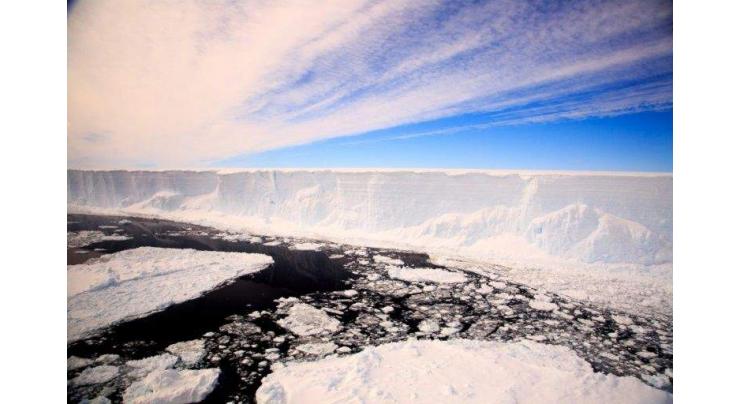
Ice Loss To Add 0.4C To Global Temperatures: Study
Mohammad Ali (@ChaudhryMAli88) Published October 27, 2020 | 10:12 PM

The loss of billions of tonnes of ice from Earth's frozen spaces is likely to increase global temperatures by an additional 0.4 degrees Celsius, according to research Tuesday highlighting the danger of a "vicious circle" of warming
Paris, (APP - UrduPoint / Pakistan Point News - 27th Oct, 2020 ) :The loss of billions of tonnes of ice from Earth's frozen spaces is likely to increase global temperatures by an additional 0.4 degrees Celsius, according to research Tuesday highlighting the danger of a "vicious circle" of warming.
Arctic summer sea ice levels have declined by more than 10 percent each decade since the late 1970s and mountain glaciers have shed roughly 250 billion tonnes of ice annually over the last century.
Ice loss from the West Antarctic and Greenland ice sheets is accelerating and already outstripping what scientists until recently believed to be the worst-case melt scenarios.
Decades of studies have sought to quantify how Earth's melting ice will contribute to sea level rise -- Antarctica and Greenland alone contain enough frozen water to boost oceans' height by around 60 metres.
But little research has tried to predict how ice loss will add to the already 1.0 degree C of global warming emissions from fossil fuels since the start of the Industrial Era.
Scientists at Germany's Potsdam Institute for Climate Impact Research (PIK) used a climate model that includes components on atmosphere, ocean, sea- and land-ice data to predict temperature change from ice loss under a variety of emissions scenarios.
They found that under current levels of atmospheric CO2 -- roughly 400 parts per million -- the melting of Arctic sea ice, mountain glaciers and the polar ice caps would raise temperatures by 0.4C.
That's on top of the 1.5C of warming our current emissions levels have rendered all but inevitable, and the safer cap on global warming aimed for in the Paris climate accord.
The main driver of temperature gain from ice loss would be due to a process known as albedo feedback, in which heat reflective bright ice is replaced by absorbant darker sea water and/or soil.
"If global ice masses shrink, this changes how much of the sunlight that hits the Earth's surface is reflected back into space," said lead author Nico Wunderling.
Recent Stories

SC orders end of encroachments in Karachi

Nazish Jahangir denies viral screenshots, calls them fake

Govt likely to hike electricity price once again

Bismah Maroof announces immediate retirement from international cricket

Malala expresses unwavering support for Gaza people

Selection committee dissolved over Pakistan women cricket team's poor performanc ..

Punjab CM Maryam Nawaz in police uniform at Chung police center

Currency Rate In Pakistan - Dollar, Euro, Pound, Riyal Rates On 25 April 2024

Today Gold Rate in Pakistan 25 April 2024

Mired in crisis, Boeing reports another loss

Session Awarding Ceremony 2024 held at Cadet College Muzaffarabad

Austrian ski great Hirscher to make comeback under Dutch flag
More Stories From World
-
Death toll from Tanzania's flash floods rises to 155: PM
5 minutes ago -
Iron ore futures close higher
15 minutes ago -
Two runaway army horses in 'serious condition': UK minister
15 minutes ago -
Myanmar's health ministry issues heat advisory amid soaring temperature
25 minutes ago -
Russian oil production facility in Siberia catches fire
25 minutes ago -
Hong Kong's Hang Seng Index closes 0.48 pct higher
25 minutes ago
-
Kremlin says Ukraine access to ATACMS will not impact outcome of conflict
35 minutes ago -
Scottish leader scraps coalition deal with Greens
35 minutes ago -
US announces sweeping cuts to power sector carbon emissions
2 hours ago -
US to give Micron $6.1 bn for American chip factories
2 hours ago -
Venice launches five-euro entry fee
2 hours ago -
New Godzilla x Kong film continues to lead Chinese box office
2 hours ago